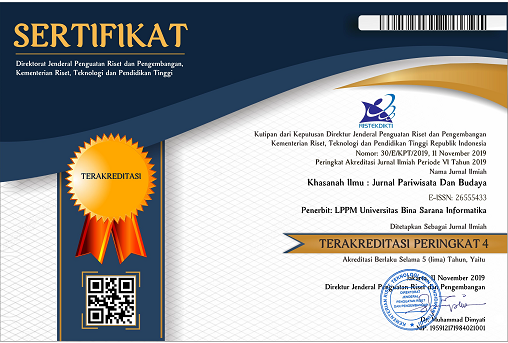Peran Gastronomi dalam Meningkatkan Daya Saing Destinasi Pariwisata: Studi pada Destinasi Wisata Kuliner di Kota Semarang
Sari
Kata Kunci
Teks Lengkap:
PDFReferensi
Abalos, R. A., Naef, E. F., Aviles, M. V., & Gómez, M. B. (2022). Consumers’ Opinion and Perception toward a Convenience Food through Projective Techniques. Journal of Culinary Science & Technology, 1–13. https://doi.org/10.1080/15428052.2022.2043211
Agyeiwaah, E. (2019). Understanding culinary tourist motivation, experience, satisfaction, and loyalty using a structural approach. Journal of Travel and Tourism Marketing, 36(3), 295–313. https://doi.org/10.1080/10548408.2018.1541775
Ahmad, A., & Johari, S. (2021). Georgetown as a Gastronomy Tourism Destination. In New Governance and Management in Touristic Destinations. IGI Global. https://doi.org/10.4018/978-1-6684-3889-3.ch005
Akyürek, S., & Erdem, B. (2019). Gastronomy museums as sustainable hangouts in gastronomy tourism: A gastronomy museum proposal for Gümüşhane City, Turkey. In Turizam (Vol. 23, Issue 1). https://doi.org/10.5937/turizam23-20717
Aliyev, V. (2022). Assessment of Gastronomic Tourism Potential in the Ganja-Gazakh Economic Region of Azerbaijan. Journal of Environmental Management and Tourism, 13(4), 1142–1150. https://doi.org/10.14505/jemt.v13.4(60).20
Alonso, A. D. (2022). Managing knowledge in the context of gastronomy and culinary tourism: A knowledge-based view. Tourism Recreation Research, 47(2), 145–159. https://doi.org/10.1080/02508281.2020.1827566
Arana, C. D. P. (2022). How to define gastronomic identity from Cultural Studies: The Peruvian case. International Journal of Gastronomy and Food Science, 27. https://doi.org/10.1016/j.ijgfs.2022.100476
Ardiansyah, I., & Silmi, N. F. (2022). Strategi Pengembangan Destinasi Wisata Kuliner Di Kota Tangerang Dengan Matriks Swot Dan Analisis Qspm ( Studi Kasus Kawasan Laksa Tangerang ). Jurnal Industri Pariwisata, 4(2), 141–160.
Badu-Baiden, F., Correia, A., & Kim, S. (Sam). (2022). How do tourists’ memorable local gastronomy experiences and their personal gastronomic traits influence destination loyalty? A fuzzy set approach. Journal of Travel & Tourism Marketing, 39(5), 501–515. https://doi.org/10.1080/10548408.2022.2148041
Batat, W. (2020). Pillars of sustainable food experiences in the luxury gastronomy sector: A qualitative exploration of Michelin-starred chefs’ motivations. Journal of Retailing and Consumer Services, 57(July), 102255. https://doi.org/10.1016/j.jretconser.2020.102255
Beer, C. L., Ottenbacher, M. C., & Harrington, R. J. (2012). Food Tourism Implementation in the Black Forest Destination. Journal of Culinary Science and Technology, 10(2), 106–128. https://doi.org/10.1080/15428052.2012.677601
Boas, G. de F. M. V. (2021). Access to regional food in Brazilian community restaurants to strengthen the sustainability of local food systems. International Journal of Gastronomy and Food Science, 23. https://doi.org/10.1016/j.ijgfs.2020.100296
Boz, N., & Ozturk, H. M. (2020). Importance of creativity and innovation for gastronomy and business tourism. In Accelerating Knowledge Sharing, Creativity, and Innovation Through Business Tourism. IGI Global. https://doi.org/10.4018/978-1-7998-3142-6.ch014
Carvache-Franco, M., Orden-Mejía, M., Carvache-Franco, W., Carmen Lapo, M. del, & Carvache-Franco, O. (2022). Gastronomy Motivations as Predictors of Satisfaction at Coastal Destinations. Sustainability (Switzerland), 14(18). https://doi.org/10.3390/su141811437
Ciptari, P. D. K., Wibawa, I. G. J. S., & Suardana, I. K. P. (2022). Pengelolaan Destinasi Wisata Kuliner dalam Mendukung Pariwisata Berkelanjutan Di Desa Suranadi. Journal of Finance and Business Digital, 1(3), 203–218. https://doi.org/10.55927/jfbd.v1i3.1335
Erbaş, E. (2019). Social Business Model and Sharing Economy for Community-Based Tourism Development: A Case Study of Lisinia Doğa. Journal of Tourism and Gastronomy Studies, 7(4), 2399–2417. https://doi.org/10.21325/jotags.2019.478
Fauzi Achmad Riyadi, D. A. P. (2023). Identintas Budaya Dan Kuliner Yogyakarta Sebagai Gastronomi Dan Perspektif Pariwisata Yang Berkelanjutan. https://doi.org/10.5281/ZENODO.7885123
Kartika, T., & Harahap, Z. (2019). Pengembangan Kuliner Pempek Sebagai Daya Tarik Wisata Gastronomi di Palembang Sumatera Selatan. Tourism Scientific Journal, 4, 211–228.
Muhamad, M. (2017). DESTINASI KEPARIWISATAAN ALAM KONEKTIFITAS UNGGULAN BERDAYA SAING (Aktualisasi Percepatan Destinasi Kepariwisataan Alam Mekanisme Jawa Timur-Bali). https://scholar.google.com/citations?view_op=view_citation&hl=en&user=4cwKU3UAAAAJ&cstart=100&pagesize=100&citation_for_view=4cwKU3UAAAAJ:4DMP91E08xMC
Pramezwary, A. (2022). Sustainability Gastronomy Tourism in Medan City. International Journal of Sustainable Development and Planning, 17(3), 875–883. https://doi.org/10.18280/ijsdp.170317
World Tourism Organization (UNWTO) & Basque Culinary Center (Eds.). (2019). Guidelines for the Development of Gastronomy Tourism. World Tourism Organization (UNWTO). https://doi.org/10.18111/9789284420957
DOI: https://doi.org/10.31294/khi.v15i2.25170










